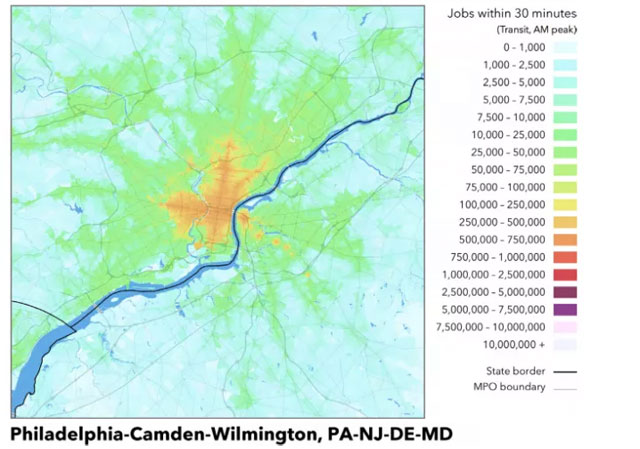How well does your city's transit system connect people to jobs? A new report from the University of Minnesota lays out how many jobs are accessible via transit in major American cities.
New York, San Francisco, Chicago, and D.C. offer the best transit access to jobs, the authors concluded. In addition, Seattle and Denver are two regions that punch above their weight, according to co-author David Levinson, a University of Minnesota civil engineering professor.
The research team analyzed transit schedules and walking distances to transit stops for every Census tract in the United States. Then they measured how many jobs were accessible via transit to the typical person in the region within 10-minute intervals. So for each region, they calculated how many jobs the average resident could reach on transit in 10 minutes, 20 minutes, and so on, up to an hour. The rankings are based on an average of those numbers, with more weight given to jobs accessible via shorter transit commutes than longer ones.
Both Seattle and Denver have devoted significant resources to transit expansions recently (with Seattle making especially strong progress enhancing transit in the central city). But transit accessibility is influenced by other factors in addition to the extent and frequency of the rail or bus network. Land use -- or how close jobs are to workers -- is another big component.
Portland, for example, probably performs well more because of its urban growth boundary than its relatively recent streetcar additions, the authors say. And San Jose may owe its high ranking to "a lot of jobs in the San Francisco metropolitan area accessible from the San Jose metropolitan area," Levinson said.
The boundaries of regions as defined by the Census do add an element of randomness to the rankings, Levinson notes. But while small regions have fewer jobs than big regions, and thus fewer transit accessible jobs, rankings tend to hold up when you adjust for size. In the lowest-ranking region, Birmingham, Alabama, just 3.4 percent of nearly 500,000 total jobs are accessible within a 60-minute transit commute for the average resident, while in New York City, about 14 percent of the region's 8.5 million jobs are transit accessible.
Levinson and his colleagues have been using this type of analysis to rank cities on job accessibility via walking and driving as well. In every U.S. metro region, the average resident can access more jobs by driving than by transit. "But the advantage is smaller in large cities (like New York) than smaller cities," said Levinson.
Accessibility, Levinson says, is a more useful metric to analyze transportation systems than measures like congestion, or annual hours of delay in traffic, which transportation planners have relied on for decades. "We build cities to maximize access, so that people can easily reach other people, goods, and ideas they care about," he said. "Without the benefits of access, there would be no reason for cities at all. So accessibility is how we should assess how well infrastructure is serving our cities."






